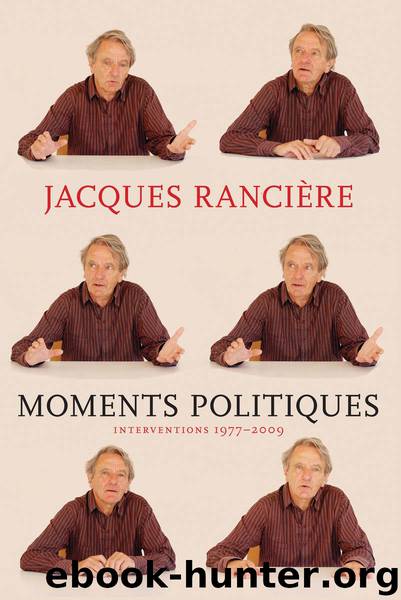Moments Politiques by Jacques Ranciere

Author:Jacques Ranciere
Language: ara
Format: epub
Tags: philosophy, politics, articles, interviews, ideology, french, united states, history, theory, essays
Publisher: Seven Stories Press
Published: 2014-10-28T00:00:00+00:00
On War as the Supreme Form of Advanced Plutocratic Consensus
In October 2003, this article was published in the journal Lignes.
Everyone agrees that the Anglo-American war in Iraq testifies to something new in the governance of our advanced societies. But it is more difficult to identify what exactly this new phenomenon is for one simple reason: our idea of the new, forged by our progressive concept of history, assumes that the new is new, and that all new things go hand in hand. Technological advance and the global power of capital are thus supposed to correspond to more and more modern forms of the exercise of power. This power is always becoming more diffuse and imperceptible, like the flow of communication. It is negotiated like merchandise. It exercises its painless effects through a globally accepted way of life. This is called, depending on one’s mood, “the invisible global governance of capital,” “triumphant mass democracy,” or “soft totalitarianism.” All of these names designate a form of government apparently far removed from military campaigns for civilization, hymns to God and flag, and lies of state propaganda. So what are we supposed to think about this new state of affairs that strangely resembles the old one? What are we supposed to think about the gap between the technological sophistication of weapons and the crudeness with which public opinion is manipulated?
Let us start with the obvious: the enormity of the lies required to weave together the image of an Iraq with weapons of mass destruction ready to strike the Western nations. The lies were not just enormous but incredible to every sensible mind. In order for them to be believed, it was necessary to resort to an old principle of propaganda, that to impose the reality of a lie, it must be pushed beyond all likelihood. “The bigger the lie, the better it passes”—precisely because it exists outside the realm of credulity. This type of principle was supposed to be a feature of totalitarian regimes. Today it appears perfectly adapted to the government of a Christian-inspired democracy. It remains to be asked why this government had need of such mendacity. The purpose seemed to be obtaining support to carry out the war. But why was war necessary when it was well known that there was no imminent danger? Because of an exaggerated feeling of insecurity? It seems necessary to reverse the terms of the problem. It wasn’t a proven insecurity that made the war necessary. On the contrary, the war was necessary to impose insecurity because the appropriate functional modality of our consensual state-societies is the management of insecurity.
Whatever the philosophers of the end of history and soft totalitarianism think, and whatever the theorists of the simulacrum and overflowing multitudes say about it, the archaic is at the very heart of extreme modernity. The advanced capitalist state is not one of an automatic consensus, where the everyday negotiation of pleasure and the collective negotiation of power and its redistributions adapt to each other. The state is not moving towards passionless conflict or a divestment of values.
Download
This site does not store any files on its server. We only index and link to content provided by other sites. Please contact the content providers to delete copyright contents if any and email us, we'll remove relevant links or contents immediately.
| Africa | Americas |
| Arctic & Antarctica | Asia |
| Australia & Oceania | Europe |
| Middle East | Russia |
| United States | World |
| Ancient Civilizations | Military |
| Historical Study & Educational Resources |
Underground: A Human History of the Worlds Beneath Our Feet by Will Hunt(12083)
Sapiens by Yuval Noah Harari(5363)
Navigation and Map Reading by K Andrew(5150)
The Sympathizer by Viet Thanh Nguyen(4383)
Barron's AP Biology by Goldberg M.S. Deborah T(4141)
5 Steps to a 5 AP U.S. History, 2010-2011 Edition (5 Steps to a 5 on the Advanced Placement Examinations Series) by Armstrong Stephen(3723)
Three Women by Lisa Taddeo(3421)
Water by Ian Miller(3176)
The Comedians: Drunks, Thieves, Scoundrels, and the History of American Comedy by Nesteroff Kliph(3064)
Drugs Unlimited by Mike Power(2590)
A Short History of Drunkenness by Forsyth Mark(2285)
DarkMarket by Misha Glenny(2206)
The House of Government by Slezkine Yuri(2190)
And the Band Played On by Randy Shilts(2188)
The Library Book by Susan Orlean(2063)
Revived (Cat Patrick) by Cat Patrick(1987)
The Woman Who Smashed Codes by Jason Fagone(1964)
The Absolutely True Diary of a Part-Time Indian by Sherman Alexie(1899)
Birth by Tina Cassidy(1899)
